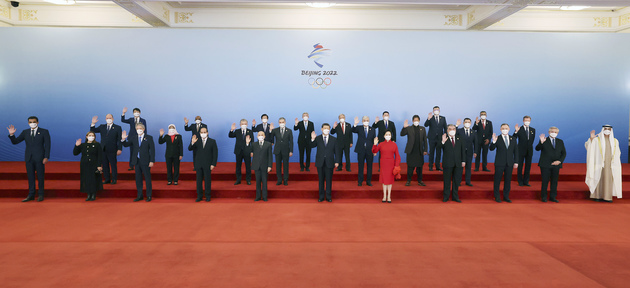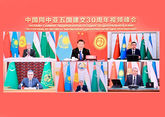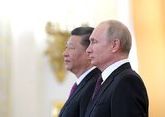On February 4, the Beijing Winter Olympic Games opened in the Chinese capital. While much of the West engaged in a “diplomatic boycott” or cited the ongoing pandemic for the absence of their top leaders, all five Central Asian presidents were in attendance, The Diplomat writes.
It’s a difficult time in the Central Asian region. Between the pandemic, the crashing of the regional electric grid, recent tensions on the Kyrgyz-Tajik border, and the aftermath of Kazakhstan’s “bloody January,” there is no absence of crises back home. Meanwhile, Central Asia sends precious few athletes to the winter games: in the single digits for all but Kazakhstan, and none from Tajikistan or Turkmenistan in 2022. So why was it important to go Beijing?
The trip wasn’t necessary to touch base with Beijing, given that all five Central Asian leaders participated in a virtual summit in late January to commemorate 30 years of diplomatic relations with China. Within a relatively new 5+1 format, the recent “China Plus Central Asia” meeting included the announcement of $500 million in grant assistance to the region, as well as ambitions to increase trade to $70 billion by 2030.
“To my mind, participation in the opening ceremony of the Beijing Olympics suggests that the Central Asian leaders had no qualms in being seen as integral to the international [system] that is emerging with the deliberate view to reshape the global order,” Luca Anceschi, professor of Eurasian Studies at the University of Glasgow, told The Diplomat. “Their presence in Beijing indicates willingness to indulge Xi’s prestige agenda: it is clear that these games are amongst the most political of the post-Cold War era, so it would impossible to divorce the leaders’ presence [at] the ceremony from their views on this event’s global reverberations,” he continued.
The key, says Niva Yau, a senior researcher at the OSCE Academy in Bishkek, Kyrgyzstan, is the Xinjiang issue. “I think key here is that the world has all eyes on the Uyghur problem right now – and having Central Asia’s absolute full support is very, very important for Beijing,” she told The Diplomat.
The United States coined the term “diplomatic boycott” in an effort to express its dissatisfaction with Chinese policies without impeding American athletes’ participation in the Olympic Games. In December, White House Press Secretary Jen Psaki announced that the Biden administration would not send official representation to the games in Beijing, “given the PRC’s ongoing genocide and crimes against humanity in Xinjiang and other human rights abuses.”
With China’s Xinjiang policies in the international spotlight as the games began, Yau said it was critical for China that the Central Asian leaders attend. “The fact that they all went to Beijing, from the Chinese perspective, is a comfort knowing that there is still regional support for its Xinjiang policy. Keeping the Uyghur problem ‘regional’ has been the strongest way to deter any form of ‘outside interference.’” “From the Central Asian perspective,” she continued. “There is little benefit in going against the Xinjiang policy, especially when supporting China means getting economic gain in return — oil and gas, some industrialization, aid etc — which in turn feeds support and resources for these countries to continue their rule. It’s a ‘win-win.’”
Kazakhstan’s President Kassym-Jomart Tokayev, in particular, was an important attendee. Kazakhstan’s largest city, Almaty, was the only rival bidding against Beijing for the 2022 Winter Olympics Games — and last month was the site of the protests. “Tokayev’s presence at the Opening Ceremony indicates that the rifts of the past are forgotten and that, at this critical political moment, the Kazakhstani leader sees the support of China and of other powers in Eurasia as a structural condition for the preservation of his power,” Anceschi said.
While the opening ceremonies presented a photo-op for the leaders of Kazakhstan, Kyrgyzstan, Tajikistan, Turkmenistan, and Uzbekistan, the games also allowed for one-on-one meetings. In his meeting with Tokayev, Xi made clear his support for the Kazakhstani president and, per the Kazakh readout, Xi accepted Tokayev’s invitation for a state visit to Kazakhstan later this year. (This is particularly intriguing since Xi has not left China since the COVID-19 pandemic began.) Several memorandums were signed with Kyrgyz President Sadyr Japarov; Tajik President Emomali Rahmon and Xi discussed “green technology” and security issues; Turkmen President Gurbanguly Berdimuhamedov, of course, discussed gas pipelines with Xi; and Uzbek President Shavkat Mirziyoyev noted efforts to strengthen the comprehensive strategic partnership.
The earlier China Plus Central Asia meeting reveals the outline of China’s relations with Central Asia, much of it replicated in the one-on-one meetings. In his remarks in late January, Xi highlighted (in this order): magnifying the “good-neighborly friendship,” including opposing “attempts by external forces to foment color revolutions” and opposing interference in other countries internal affairs “under the pretext of human rights”; high-quality development; strengthening “the shield for defending peace”; and encouraging a multifaceted system of exchange.
Within both the regional and international contexts, the visits by all five Central Asian presidents to China illustrate that the importance of the relationship for both sides is multidimensional. “Agreements signed at the margins of the ceremony confirm that the economic dimension stays central to China-Central Asia relations but, on this occasion, there is a clear political message that goes beyond merely sitting through an opening ceremony in a cold winter night,” Anceschi concluded.










